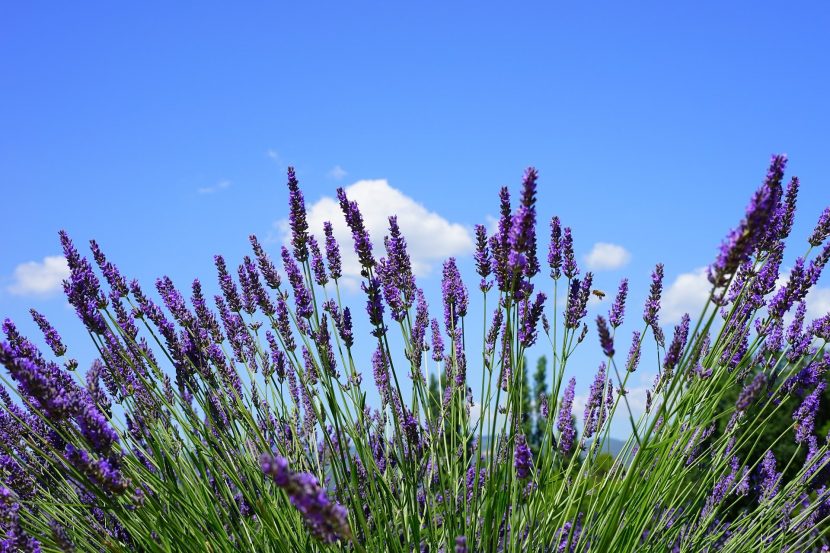When the day is trying you, try soaking in a tub with a lavender bath bomb while using lavender soap. Set your mind right, dry off, and head to bed.
Some scents are more soothing than others.
Lavender has been widely studied and shown to improve sleep.
It’s safe to say sleep, rest, calmness, and relaxation are the top benefits of lavender.
Other scents also show promise in the same area.
A rose scent has been shown to help learning in children. Perhaps it can help adults too.
Roman chamomile has been shown to improve overall sleep time in older adults.
Jasmine was demonstrated to improve the efficiency of sleep. Study subjects spent more actual time sleeping.
Combined with visualization, aromatherapy with lavender and these other scents can be a worthy part of your nightly sleep arsenal. It calms anxiety and reduces stress.
None of the other scents have been studied as much as lavender. The studies consistently show it to be clinically effective.
While you can use many different scents (having a proclivity to collect essential oils makes that easy), perhaps it makes sense to focus on what has the most proof.
That would call for using lavender.
Emotions, lavender, and a sense of place
The scent of lavender always brings me back to a rolling hillside in the Bay Area about 12 years ago. It was a cool morning. I got out of the subcompact car I had rented and looked around, stretching. The air was full of the scent of thousands of purple flowers everywhere.
The flowers crowded the hillside. The butterflies did, too, fluttering from bud to bloom. Nature rioted in its colorful way.
It was June. I had the day off from work at a nearby military post in the area. Having the day off meant I felt like a weight had been taken off my shoulders. If I was any more relaxed, I’d have been sleeping and unable to drive the car. It’s the kind of relaxation you do when you’ve had many high-stress days in a row. At that time, days off were few and far between, especially with the always simmering conflicts in Iraq and Afghanistan.
Lavender benefited my sense of peace then; the memory benefits me now.
That year, California received a good amount of rain. The clouds weren’t as stingy with rain as it has been from time to time in recent years.
The mental visual of the hillside complements any effort I make to use lavender oil for sleep. It always helps to have a visual like that tucked into the memory banks. Several studies show it helps plenty of other people with mild to moderate insomnia as well (Lillehei, Halcón, Savik et al., 2015) and (Stevens, Dorsett, DaBell, et al., 2017).
Before taking any sleeping pill, a whiff of lavender before bed is definitely worth trying.
That, and speaking from experience, visualizing a field of lavender helps.
Any relaxing nature scene will probably do, however.
No need to overdo it to the point where you’re gagging from an intense concentration of the scent. A hint of the fragrance will provide you with the most benefit.
How to use lavender
The scent is available in many different vehicles. There are aromatic diffusers, candles, bubble baths, soap, bath bombs, dryer bags, and sachets for starters.
Not all seem designed for sleep. Lavender syrup is something you can put on pancakes or ice cream or in a cocktail. Lavender tea, some people swear, helps them with anxiety and helps them go to sleep.
Ignore anything that doesn’t feature the scent. It’s the scent of lavender, after all, that has been extensively studied.
It’s pretty wide open how you could use lavender for sleep. For many of the studies, they applied essential lavender oil to a cotton pledget and either put it on the subject’s chest or between their pillow and pillowcase.
If you enjoy taking baths at night, try a lavender soak.
The key is to let yourself unwind.
Use a fake scenario: Imagine yourself on a hillside. Lavender farms are found on both coasts, though it favors hot, dry climates. Imagine being surrounded by a field of flowers all gently swaying in the warm breeze, like in the picture above.
Inhale deeply.
If you’ve never been happy on a lavender-covered hillside, feel free to use your own relaxing image.
The scent can be a sweet lullaby for your senses. However, it doesn’t have to be intense to help you sleep. If the aroma is too strong, it can be overwhelming and ultimately hinder your rest. It’s important to find a balance to benefit from the fragrance. The fragrance doesn’t need to be so strong that it gags you.
As you drift off to sleep, allow the scent of your favorite essential oil to surround you, calming your mind and body, and helping you to achieve a night of deep and peaceful sleep.
What you can do with some lavender:
Additional Resources:
Lillehei, A. S., Halcón, L. L., Savik, K., & Reis, R. (2015). Effect of Inhaled Lavender and Sleep Hygiene on Self-Reported Sleep Issues: A Randomized Controlled Trial. Journal of Alternative & Complementary Medicine, 21(7), 430–438. https://doi.org/10.1089/acm.2014.0327
Stevens, N., Dorsett, J., DaBell, A., Eggett, D. L., Han, X., Parker, T. L., & Kay, N. (2017). Subjective assessment of the effects of an herbal supplement containing lavender essential oil on sleep quality: A randomized, double-blind, placebo-controlled crossover study. Cogent Medicine, 4(1), 0. https://doi.org/10.1080/2331205X.2017.1380871
Ozkaraman, A., Dugum, O., Yilmaz, H. O., & Yesilbalkan, O. U. (2018). Aromatherapy: The effect of lavender on anxiety and sleep quality in patients treated with chemotherapy. Clinical Journal of Oncology Nursing, 22(2), 203+. https://0-link-gale-com.mwrlibrary.armybiznet.com/apps/doc/A535236303/AONE?u=cfsc&sid=bookmark-AONE&xid=9dc8a175
Updated March 2, 2023
The DRS uses affiliate links in our posts. If you click on a link and make a purchase, we may receive a commission. This arrangement does not affect our opinion about anything.
